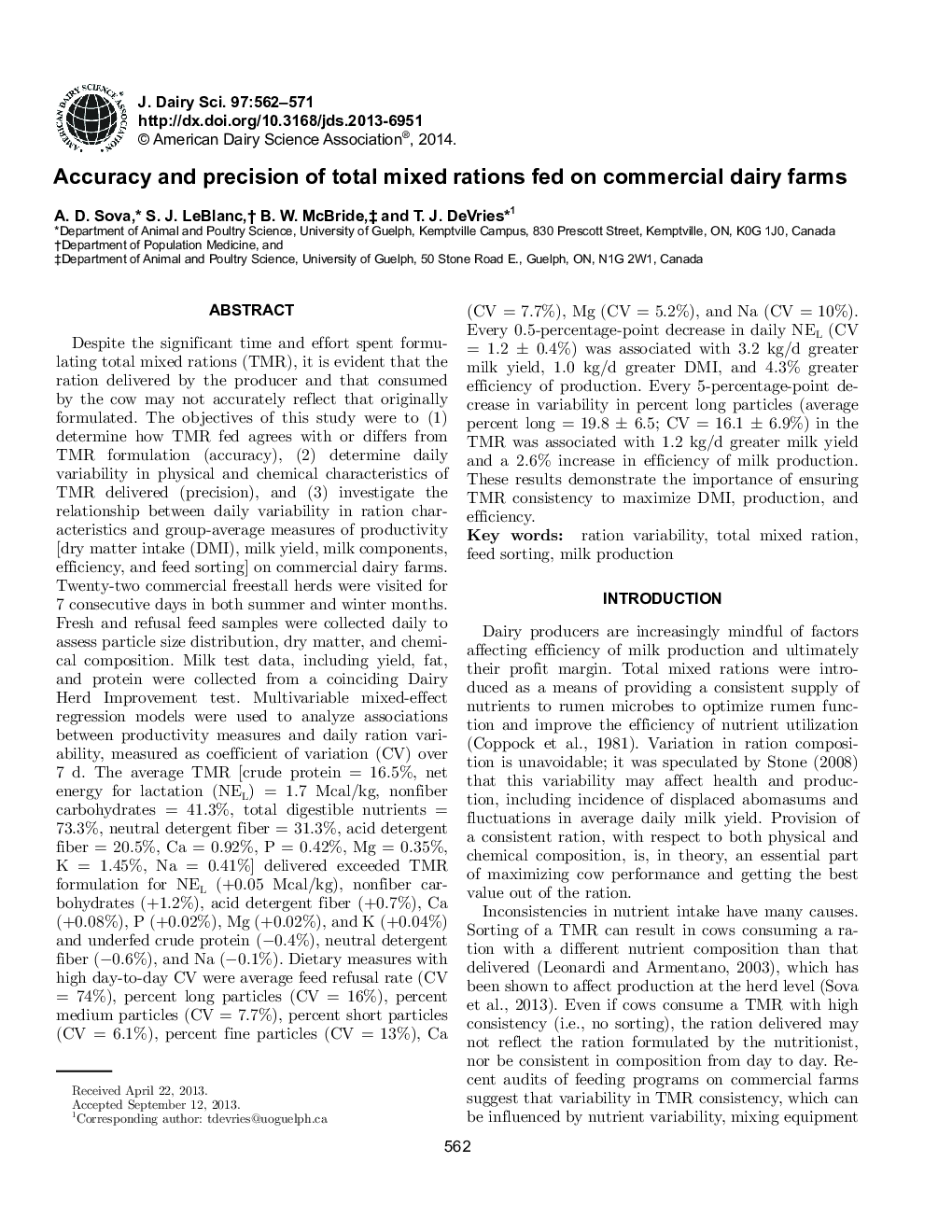| کد مقاله | کد نشریه | سال انتشار | مقاله انگلیسی | نسخه تمام متن |
|---|---|---|---|---|
| 5789606 | 1108052 | 2014 | 10 صفحه PDF | دانلود رایگان |
عنوان انگلیسی مقاله ISI
Accuracy and precision of total mixed rations fed on commercial dairy farms
ترجمه فارسی عنوان
دقت و صحت کل جیره مخلوط شده در مزارع لبنی تجاری
دانلود مقاله + سفارش ترجمه
دانلود مقاله ISI انگلیسی
رایگان برای ایرانیان
کلمات کلیدی
تنوع زیستی، مجموع جیره مخلوط، مرتب غذا، تولید شیر،
موضوعات مرتبط
علوم زیستی و بیوفناوری
علوم کشاورزی و بیولوژیک
علوم دامی و جانورشناسی
چکیده انگلیسی
Despite the significant time and effort spent formulating total mixed rations (TMR), it is evident that the ration delivered by the producer and that consumed by the cow may not accurately reflect that originally formulated. The objectives of this study were to (1) determine how TMR fed agrees with or differs from TMR formulation (accuracy), (2) determine daily variability in physical and chemical characteristics of TMR delivered (precision), and (3) investigate the relationship between daily variability in ration characteristics and group-average measures of productivity [dry matter intake (DMI), milk yield, milk components, efficiency, and feed sorting] on commercial dairy farms. Twenty-two commercial freestall herds were visited for 7 consecutive days in both summer and winter months. Fresh and refusal feed samples were collected daily to assess particle size distribution, dry matter, and chemical composition. Milk test data, including yield, fat, and protein were collected from a coinciding Dairy Herd Improvement test. Multivariable mixed-effect regression models were used to analyze associations between productivity measures and daily ration variability, measured as coefficient of variation (CV) over 7 d. The average TMR [crude protein = 16.5%, net energy for lactation (NEL) = 1.7 Mcal/kg, nonfiber carbohydrates = 41.3%, total digestible nutrients = 73.3%, neutral detergent fiber = 31.3%, acid detergent fiber = 20.5%, Ca = 0.92%, p = 0.42%, Mg = 0.35%, K = 1.45%, Na = 0.41%] delivered exceeded TMR formulation for NEL (+0.05 Mcal/kg), nonfiber carbohydrates (+1.2%), acid detergent fiber (+0.7%), Ca (+0.08%), P (+0.02%), Mg (+0.02%), and K (+0.04%) and underfed crude protein (â0.4%), neutral detergent fiber (â0.6%), and Na (â0.1%). Dietary measures with high day-to-day CV were average feed refusal rate (CV = 74%), percent long particles (CV = 16%), percent medium particles (CV = 7.7%), percent short particles (CV = 6.1%), percent fine particles (CV = 13%), Ca (CV = 7.7%), Mg (CV = 5.2%), and Na (CV = 10%). Every 0.5-percentage-point decrease in daily NEL (CV = 1.2 ± 0.4%) was associated with 3.2 kg/d greater milk yield, 1.0 kg/d greater DMI, and 4.3% greater efficiency of production. Every 5-percentage-point decrease in variability in percent long particles (average percent long = 19.8 ± 6.5; CV = 16.1 ± 6.9%) in the TMR was associated with 1.2 kg/d greater milk yield and a 2.6% increase in efficiency of milk production. These results demonstrate the importance of ensuring TMR consistency to maximize DMI, production, and efficiency.
ناشر
Database: Elsevier - ScienceDirect (ساینس دایرکت)
Journal: Journal of Dairy Science - Volume 97, Issue 1, January 2014, Pages 562-571
Journal: Journal of Dairy Science - Volume 97, Issue 1, January 2014, Pages 562-571
نویسندگان
A.D. Sova, S.J. LeBlanc, B.W. McBride, T.J. DeVries,
